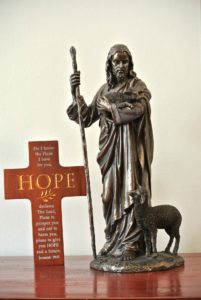As you delve more and more into the Book of Hebrews, you will become aware of something you have never seen before: namely, the author of Hebrews is more emphatic than any other Bible writer about one major theme; God wrote all the Old Testament Scriptures.
This author quoted at least thirty one Old Testament Scriptures in the book of Hebrews. Even when he knew the name of the human instrument that God used to write Scripture, this author spoke as though the Scripture was penned by God himself. For him, God wrote the Old Testament without the use of a human instrument even though He used them.
As you study this fascinating book, look for the above attribute throughout. This will be such a great blessing to you. Why can’t modern teachers, pastors, academics and scholars have the same view of (and respect for) the Holy Scriptures as this special, Godly author of Hebrews?
Here is just a sampling of the Old Testament Scriptures the author quoted in the Book of Hebrews. In each and every case, our author of Hebrews declared that God wrote each Scripture, even though they had human penmen. See below how he demonstrates that God wrote them.
Heb 1:5
5 For unto which of the angels said he at any time, Thou art my Son, this day have I begotten thee? And again, I will be to him a Father, and he shall be to me a Son? (KJV)
Two Old Testament Scriptures are quoted here, Ps. 2: 7 and 2 Samuel 7: 14. David wrote the Psalm; Samuel wrote the one that bears his name. But notice how our author demonstrated that God himself wrote these two Old Testament Scriptures for us; look at the expression, “said he.”
In other words, the Hebrews author always quoted the Old Testament in such a way as to leave no doubt: God wrote the Old Testament. Above, he used the expression, “he said” for “God said.” Notice, however, that he never remotely implied that either David or Samuel said anything in this verse. For this author, God wrote the Old Testament.
Now, look at the next verse, Hebrews 1: 6. We shall see the same thing.
Heb 1:6
And again, when he bringeth in the firstbegotten into the world, he saith, And let all the angels of God worship him. (KJV)
This verse is a quote from Dt. 32: 34. Notice here also the expression, “he saith.” Again, the author never implied that Moses wrote the above Scripture. By using “he saith” as he did above, he again shows his belief that God wrote it. For him, God authored all Old Testament Scripture.
Heb 1:7
7 And of the angels he saith, Who maketh his angels spirits, and his ministers a flame of fire.
(KJV)
The above verse quotes Psalms 104: 4. But notice! He used “he saith” again. To this author, God authored this Psalm also. Why cannot modern writers, preachers and theologians have the same confidence that God was the author of Scripture?
Now see the next two Old Testament Scriptures quoted below.
Heb 1:8
8 But unto the Son he saith, Thy throne, O God, is for ever and ever: a sceptre of righteousness is the sceptre of thy kingdom. (KJV)
Heb 1:13
But to which of the angels said he at any time, Sit on my right hand, until I make thine enemies thy footstool? (KJV)
Notice “he saith” in verse 8 above and “said he” in verse 13 above. For this author, God authored the Old Testament. What a thrill to see the pattern for modern scholarship so clearly given. Hebrews is the most unusual New Testament book.
Following the lead from the author of Hebrews, Scripture was and still stands written by God himself. As such, you can believe and depend on what it says. Furthermore, when you are troubled about what a particular Scripture means, ask yourself, “What does this Scripture say?” You will, then, have the answer to what it means.
Finally, Paul summed it up for us. He said “God breathed” all Scripture to profit us in at least six areas. Find them for your own benefit in the verses below.
2 Tim 3:16-17
16 All scripture is given by inspiration of God, and is profitable for doctrine, for reproof, for correction, for instruction in righteousness:
17 That the man of God may be perfect, throughly furnished unto all good works.
(KJV)
God wrote it with His own breath even though He used human instruments. Therefore, you can trust it. You can stand on it. You can step out on it. He said what He meant to say in it. What does a Scripture mean? It means whatever that Scripture says.





